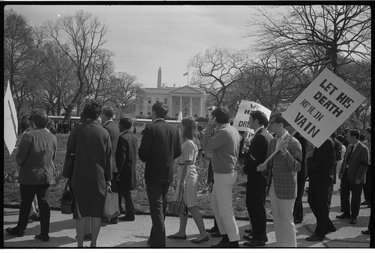Fair housing is a hard-won American right
— Library of Congress
Demonstrators with signs, one reading “Let his death not be in vain,” march in front of the White House after the assassination of Martin Luther King in April 1968. The day after King’s death, President Lyndon B. Johnson reiterated his call for “Congress to guarantee a basic American right — the right of a man to secure a home for his family regardless of the color of his skin.” The stalled bill passed by a wide margin.
We need to call out prejudice when we see it and stress the need to realize common opportunities in a single society.
Last week, Enterprise reporter Sean Mulkerrin, who covers planning in Guilderland, submitted a story on a proposal for changing Pine Bush Senior Living to include affordable housing for seniors.
One of the speakers at the hearing — Andy Arthur, a Delmar resident and a member of Save of the Pine Bush — objected to lower-income housing, asserting that a lot of poor people commit crimes.
Arthur went on: “Will this raise the crime rate in Guilderland, will it raise the crime rate in the Pine Bush, will it be more dangerous to hike at Pine Bush at night or in the evening? Will there be more muggings, will there be more pickpocket activities, cars broken into?”
He also asserted that “low-income people” may have more healthcare needs and “different recreational desires,” which should be evaluated.
Mulkerrin concluded his story with these words, which he knew his editor would remove:
“There is a Stewart’s Shops nearby, so loitering, one of poor people’s favorite pastimes, is a possibility. Also in the nearby 20 Mall on Western Avenue is a wine and liquor store — so getting drunk, another pastime favored by poor people, could be enjoyed.”
Although I shared Mulkerrin’s outrage at the assertions Arthur had made, I removed his satirical ending because, in our news stories, we strive to report fairly whatever we are covering. We present accurate quotes and the most objective view we can muster.
We save our opinions for the editorial page. We stand against bigotry. We stand for creating a society with opportunity — including fair housing — for all.
The Enterprise favors affordable housing in Guilderland, as we have written on this page before. Much of the new development in town is beyond the reach of average as well as low-income earners — including elderly residents who have lived their entire lives in Guilderland.
The narrative included with the board’s agenda last Tuesday said Pine Bush Senior Living is designed for 55-plus senior-citizen households whose incomes are from 30 percent to 90 percent of the area median income — net rents would range from about $444 to $1,244 per month. Albany County’s average median household income is about $66,000, according to the Capital District Regional Planning Commission.
Fourteen of the units are being set aside for frail elderly seniors; nine units are being designed for mobility-impaired residents; and four units are for seniors who have a visual and/or auditory impairment.
Prior to making the switch to affordable housing, monthly rent at the independent-living facility was estimated to start at $2,900.
A market study that was posted with last Tuesday’s agenda said there are “extensive waitlists at age-restricted projects in the area.”
The study established “a market draw area that includes tracts on the western side of Albany, Guilderland, Altamont and Bethlehem as these areas have historically supported rental units in the area.”
Occupancy rates for comparable units in the primary market area are 99.5 percent, the study says, while stating that no affordable housing has been built in the area in over 10 years. At the same time, the study finds that 35 percent of renters aged 55 and older in the primary market area earn below $30,000, which is the targeted income base for most unit types in the project.
“This has resulted in area seniors remaining in their homes and older rental units or moving out of the area for affordable housing options,” the study says.
Why wouldn’t Guilderland want to offer its elderly and its frail residents a place to live in town?
We have no quarrel with environmental arguments coming from Save the Pine Bush. We have, over the years on this page, supported the grassroots advocacy group that has fought — many times successfully — to save the rare inland pine barrens in our midst.
The Pine Bush Senior Living proposal would be built on 11 acres, facing Karner Road, of a 51-acre parcel, with the remaining acreage being donated to the Pine Bush Preserve.
What we are objecting to is the prejudice we heard, which was applauded, at last week’s hearing.
In a compelling letter to the editor this week, the town’s planner, Kenneth Kovalchik, wrote of Arthur’s comments: “Unfortunately for me, comments like this, and worse, are common, particularly when multi-family projects are proposed in our community.”
He goes on to list discriminatory comments he has heard over the past three years during his work as town planner, including: “It’s not that we don’t like apartments, we don’t like the people that live in the apartments”; “I don’t want my kids going to school with the kids that live in those apartments”; “I don’t want those people walking through our neighborhood”; “I don’t want those people living next to me.”
Who are “those people?” People who earn less money than the gatekeepers? Or people who are of a different race or religion than the gatekeepers?
Kovalchik rightly points out that housing discrimination violates federal law as he offers our readers a primer on the Fair Housing Act. We urge Arthur and those who think like him to read Kovalchik’s letter while we provide a bit of history.
The Fair Housing Act is part of the Civil Rights Act of 1968. Just after the Civil War, the Civil Rights Act of 1866 was meant to help people who had been enslaved. It declared that all people born in the United States were citizens — they could rent, sell, hold, and buy property.
But the 1866 act had no teeth — no means of enforcement — and housing discrimination persisted.
It took the race riots of 1967 for the Kerner Commission to recommend “a comprehensive and enforceable federal open housing law.”
The commission concluded, “Our nation is moving toward two societies, one black, one white — separate and unequal.”
After the assassination of Martin Luther King Jr. on April 4, 1968, meaningful action on fair housing was finally taken.
On April 5, President Lyndon B. Johnson wrote a letter to the Speaker of the House of Representatives, John W. McCormack: “Last night America was shocked by a senseless act of violence. A man who devoted his life to the nonviolent achievement of rights that most Americans take for granted was killed by an assassin’s bullet.
“This tragedy has caused all good men to look deeply into their hearts. When the Nation so urgently needs the healing balm of unity, a brutal wound on our conscience forces upon us all this question: What more can I do to achieve brotherhood and equality among all Americans?”
Johnson reiterated his call for “Congress to guarantee a basic American right — the right of a man to secure a home for his family regardless of the color of his skin.”
The stalled bill passed in the House by a wide margin on April 10, and was signed into law by Johnson on April 11.
In the years since 1968, other protected classes have been added, including sex, people with disabilities, families with children, and pregnant women.
We would be wise, now, more than a half-century after the 1967 race riots, as we find ourselves in another period of upheaval and a widening gap between the haves and have-nots, to heed the words of the Kerner Commission:
“To pursue our present course will involve the continuing polarization of the American community and, ultimately, the destruction of basic democratic values. The alternative is not blind repression or capitulation to lawlessness.
“It is the realization of common opportunities for all within a single society …. From every American it will require new attitudes, new understanding, and, above all, new will.”
We urge the gatekeepers in Guilderland to open their hearts.



